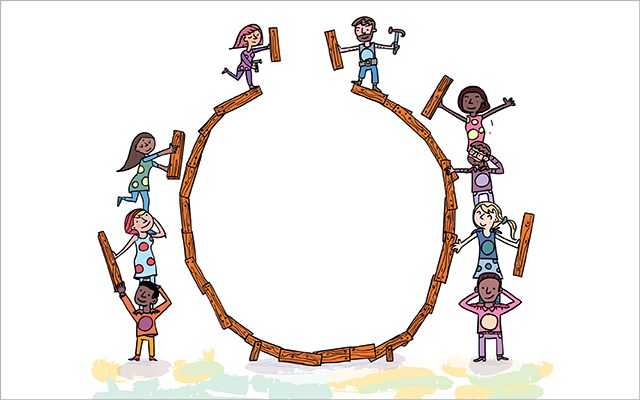Although we are digitally connected to more and more people, our social lives are suffering. Researchers at Harvard Kennedy School found that Americans were much less likely to invite friends for a visit in 2000 than they were in 1975: The number of these visits dropped by 45 percent. Participation in clubs and civic organizations plunged by more than half during that same period.
As rewarding and comforting as face-to-face conversation can be, reaching out can be intimidating for some of us. Interacting in real time involves risks that can feel daunting.
“Really seeing someone else and who they are requires being willing to be seen yourself,” says Dallas Hartwig, the New York Times best-selling coauthor of The Whole30 and the creator of the More Social Less Media program. “And when we show ourselves, we catalyze someone else to do it. It becomes a virtuous cycle.”
Creating opportunities for positive interactions takes practice — with people we know, as well as with strangers, Hartwig notes. He and other experts suggest trying the following strategies:
- Don’t wait. Invite someone you know well or want to know better for coffee, a drink, or a walk — don’t wait for a special occasion or the “right” time.
- Make new connections. Say hello to a stranger. A 2014 study of mass-transit commuters, published in the Journal of Experimental Psychology: General, found that participants who interacted with their seatmates en route had a more positive experience.
- Be a joiner. Sign up for a class, book group, hiking club, or volunteer position. According to a research group at Harvard, joining a club improves your life expectancy on par with quitting smoking.
- Stow your phone. Be mindful of how the presence of a phone can influence interactions. A visible device signals that a conversation may well be interrupted and can keep topics superficial.
- Flip the script. Instead of the generic “How are you?” ask more-specific questions of your friends and acquaintances. Try “What’s making you happy these days?” or even “How are your kids?” People generally open up more when they’re talking about what they love.
- Listen. Let go of any preconceptions and be present in conversation. You know you’re listening if you can identify the other person’s feelings. This practice hones curiosity and is critical for cultivating empathy.
- See what happens. Go into conversations without an agenda. Just start talking and see where it leads.
This originally appeared in “Real-Life Connections” in the June 2016 issue of Experience Life.




This Post Has 0 Comments